
For the Bannu group of families, there are a range of adverse impacts — early marriages (not uncommon before displacement), domestic and sexual violence, poor or absent health facilities particularly for maternal care and midwifery, lack of education resources at every level and inadequate shelter that is culturally inappropriate which in itself feeds through to high levels of depression among women. In virtually every category of deprivation that can be envisaged, the Bannu group of families are deteriorating; and are going to find it exceedingly difficult to recover — even if the civil administration stretches itself to meet their needs when they go home. There can be no denial of the empirical data contained in the survey report “Profiling of IDPs living in spontaneous settlements in Bannu”. This is evidence of a self-inflicted wound and a failure to think through and prepare for the consequences of such a large decanting of a population — and the Bannu group will not be alone in their misery. There are 59 per cent of girls out of school and 30 per cent of boys. At least 21 per cent of adult respondents expressed deep concern about early marriages and that there was a rise in “negative behaviour against women in general” plus a rise in domestic violence. The true horror lies in the fact that these results could not have been unexpected, and if there is a recipe for the radicalisation of a population, then it lies before us. As you sow then so shall you reap.
Published in The Express Tribune, April 6th, 2016.
Like Opinion & Editorial on Facebook, follow @ETOpEd on Twitter to receive all updates on all our daily pieces.

1735196035-0/beyonce-(7)1735196035-0-165x106.webp)




1735025557-0/Untitled-(96)1735025557-0-270x192.webp)











COMMENTS (1)
Comments are moderated and generally will be posted if they are on-topic and not abusive.
For more information, please see our Comments FAQ